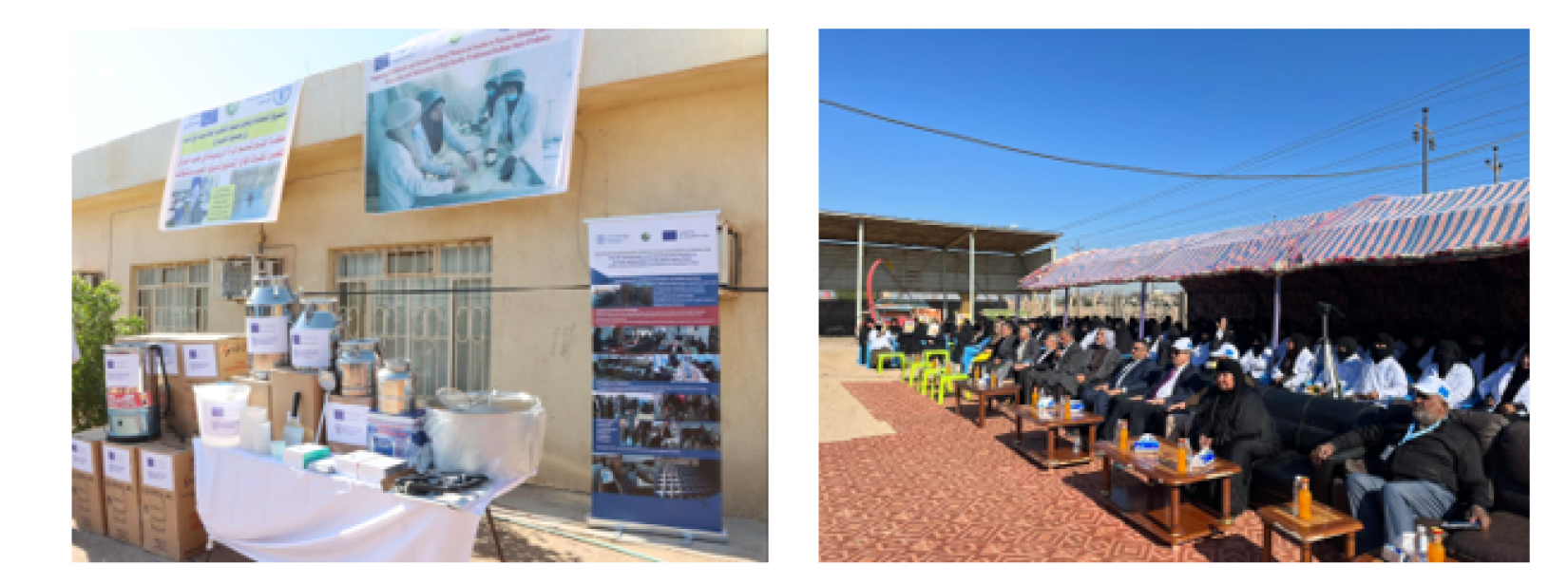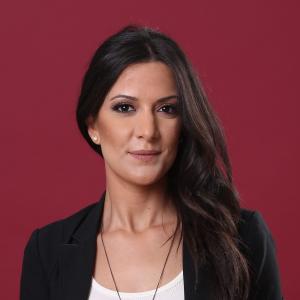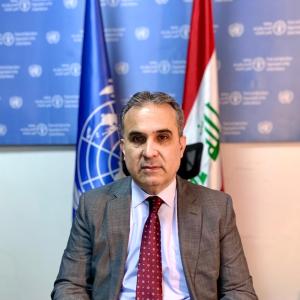FAO-EU raises hope for Buffalo Producers in Southern Iraq with Promoting Sustainable Agriculture and Empowering Rural Women
04 December 2023
Basra, Iraq - December 3rd, 2023 - In a groundbreaking move towards sustainable agriculture and under the "Restoration and Strengthening the Resilience of Agri-Food Systems in Southern Iraq." project funded by the European Union and implemented in cooperation with the Ministry of Agriculture (MoA), the Food and Agriculture Organization of the United Nations (FAO) is taking transformative actions to uplift buffalo breeding sector in Southern Iraq.

This initiative, mainly focuses on supporting the role of rural women, livelihood enhancement, and introducing practical applications for sustainable agriculture.
In this context, a number of marketing points (Caravans) were directly delivered to beneficiary women’s groups in Qurna, Basra as part of a group of 19 caravans for women's groups in Basra, Dhi Qar and Maysan. This strategic move aims to empower women, enhance their pivotal role in the dairy value chain, and elevate the marketing potentials of dairy products.
A distribution ceremony was also held at Al-Qurnah Extension Farm under the patronage of his excellency the Minister of Agriculture, represented by Dr Mithaq Al Khafaji, and in the presence of Dr Ibrahim Al Saedi from the Advisory Board in the Prime Minister's Office, the Assistant to Al Basra's Governor for Agriculture Department Affairs, the Director of Agriculture in Basra, the head of Basra framers’ association and a large number of farmers, during which a first batch of 200 butter churns out of a total of 1,000 were distributed . These machines use cutting-edge technology and are designed to significantly reduce manual churning time from 2-3 hours to 20 minutes, with minimal effort enabling rural women to save time and efforts for other household and daily life priorities.
This event signifies a substantial step forward in promoting sustainable agriculture, empowering local communities, enhancing livelihoods, and introducing cutting-edge suitable machinery and equipment.
Led by the FAO international expert Dr Chedly Kayouli , this component of the project program focuses on fortifying the rural dairy value chain in the marshes of South Iraq, including handling, storage, cooling, processing, and marketing.
In his opening speech, FAO representative, Dr. Salah El Hajj Hassan, expressed his enthusiasm, stating "Today's events represent a major step towards empowering women and fostering sustainable agriculture in Southern Iraq. The collaboration with the Ministry of Agriculture and local authorities and the financial support and partnership with the European Union has been instrumental in achieving these milestones. We are actively working to build on the success of this project and keep pace with similar achievements. We hope that these initiatives will lay the groundwork for sustainable agriculture, improved livelihoods, and the integration of new technologies and practices in the region.”
The Technical Deputy of the Ministry of Agriculture, Dr. Mithaq Al Khafaji, also emphasized the project's significance, saying, "The collaboration between the Ministry of Agriculture and FAO is crucial for the development of the agri-food sector in Southern Iraq. This initiative aligns with our vision to strengthen the resilience of rural communities and promote sustainable agriculture."
Dr Ibrahim Al Saedi highlighted the extremely important progress made by this project to develop the dairy sector and support rural women, which can be considered as one of the most successful examples to be scaled up further.
The participating officials highlighted the ongoing significant impact of FAO-EU funded project activities in the region, expressed appreciation for the positive effects on local communities, and reiterated their full support and commitment to ensure the continued success of these transformative initiatives.
The mission extended to green fodder fields in the Nahr Al-Saba village/Al Mdayna district, where officials observed the ongoing success of the forage program, which introduced, for the first time in southern Iraq, soil and climate conditions resistant crops. Smart irrigation techniques continue to contribute to exceptionally high production rates, resulting in a significant increase in milk production and improvements in farmers' incomes.
The project, under the broader umbrella of the EU Agri-Food Business Development Programme, aims to improve governance and job creation along several agri-food value chains in Iraq. This initiative represents a major stride in fostering sustainable agriculture, empowering women, and strengthening agri-food systems in Southern Iraq. FAO remains committed to supporting initiatives aligned with United Nations Sustainable Development Goals (SDGs), including but not limited to Goal 1: No Poverty, Goal 2: Zero Hunger, Goal 5: Gender Equality, and Goal 8: Decent Work and Economic Growth.


He started his career in 1984, as Senior Research Assistant in the Agricultural Research and Education Centre (AREC), American University of Beirut. From 1987 to 1991, he was Coordinator of the Student Training Programme, and also Agriculture and Horticultural Teacher for the Faculty of Agriculture, at the Lebanese University.
From 1991 to 1995, he worked as Agricultural Engineer at the Ministry of Agriculture, Bekaa Regional Office, Zahlah and was then assigned to the Agricultural Research Institute in the Tal Amara station, first as Head of the Crop Production Department and subsequently in charge of the Plant Protection Laboratory. From 2002 to 2006, he was Director of the Kfardane Research Station (Agricultural Research Institute). In 2008, he became Visiting Scientist at the International Maize and Wheat Improvement Centre (CIMMYT) and Coordinator of a project with the International Centre for Atomic Energy Agency, Vienna.
In 2010, he served as Advisor to the Minister for Agriculture of Lebanon. In 2011, he became President of the Pesticide Scientific Committee, Head of the Phytoplasma Committee and Director of the Agriculture and Rural Development Programme (ARDP) (EU-funded project). From 2010 to 2013, he represented Lebanon in negotiations with EU, Egypt, Jordan and Iraq. During his career, Mr Hajj Hassan also carried out a number of other functions. He represented the Lebanese Agricultural Research Institute (LARI) in several research programmes with the International Centre for Agricultural Research in the Dry Areas (ICARDA) and the American University of Beirut. He was Coordinator of the Mashreq/Maghreb project with ICARDA, representing Lebanon in the Steering Committee, as well as being the Head of the Sugar-beet Delivery and of the Wheat Delivery Committees. For a number of years, Mr Hajj Hassan worked for the preparation of FAO TCP projects and served as the National Director of a TCP project. He joined FAO in January 2014 as FAO Representative in Yemen. Mr Hajj Hassan succeeds Mr El Zubi as FAO Representative in Iraq.



